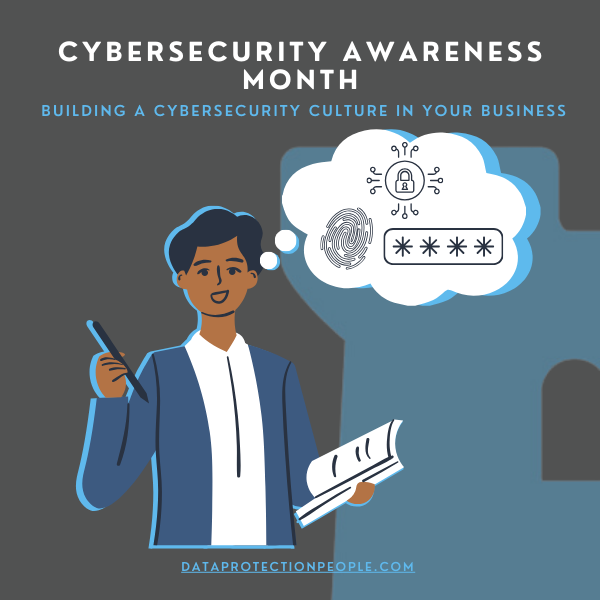Cybersecurity Awareness Month
October is Cybersecurity awareness month. In this blog, we discuss how you can build a cybersecurity culture within your business.

Cybersecurity Awareness Month: Building a Cybersecurity Culture in Your Business
October is Cybersecurity Awareness Month, a timely reminder of the importance of staying vigilant in a world where cyber threats are becoming increasingly sophisticated. At Data Protection People, we believe that effective data protection and cybersecurity aren’t just the responsibility of IT departments—they’re a collective effort. Creating a cybersecurity-conscious culture within your organisation is the first and most critical step toward defending your business from threats that could have devastating consequences.
This blog explores why building a cybersecurity culture within a business is essential and how businesses can teach their employees to recognise and respond to cyber threats. Let’s break down the steps for cultivating a secure environment where everyone is responsible for safeguarding data.
Why is Cybersecurity Culture So Important?
Cybersecurity threats don’t just target large corporations. Small and medium-sized businesses are also prime targets for cybercriminals, who often see them as low-hanging fruit due to potentially weaker defences. Whether it’s ransomware attacks, phishing schemes, or insider threats, the risk is real for all businesses, regardless of size or industry.
Here’s why building a cybersecurity culture is critical:
- Cybersecurity is Everyone’s Responsibility
While IT departments handle the technical side of security, employees are often the first line of defence. A cybersecurity culture ensures that everyone in the organisation understands their role in keeping sensitive data secure and knows how to avoid common pitfalls like phishing emails or weak passwords. - Human Error is a Top Cybersecurity Risk
Despite the most advanced security systems, one of the biggest vulnerabilities in any organisation is human error. According to recent studies, a significant percentage of data breaches are caused by employee mistakes. By promoting security awareness and training, businesses can reduce the likelihood of such errors and strengthen their overall security posture. - Protecting Reputation and Compliance
Beyond the financial loss, a cyberattack can seriously damage a company’s reputation and lead to regulatory fines, especially under UK GDPR and other data protection regulations. Businesses that make cybersecurity a priority can better protect their brand and ensure compliance with legal obligations.
Steps to Building a Cybersecurity Culture in Your Organisation
Cultivating a cybersecurity-conscious workforce takes time, effort, and commitment. Here are actionable steps businesses can take to foster this culture:
- Leadership Commitment: Lead by Example
Leadership needs to visibly prioritise security by investing in training, policies, and tools to protect the business. When employees see that management is committed to cybersecurity, it underscores its importance across the organisation. - Comprehensive Employee Training
Training should be an ongoing process that is regularly updated to reflect new threats. Key training topics should include: –
-Phishing Awareness: Employees need to recognise phishing emails, which remain one of the most common attack vectors. Providing real-world examples and conducting phishing simulations can help employees spot suspicious activities.
-Password Security: Educate staff on the importance of strong, unique passwords and using multi-factor authentication (MFA). Offering tools like password managers can simplify this for employees.
–Data Handling Practices: Ensure employees know how to securely handle, store, and transfer sensitive data.
–Incident Reporting: Employees must feel comfortable reporting suspicious activity without fear of blame. Establish clear channels for reporting and make it a seamless process. - Phishing Simulations and Interactive Learning
One of the most effective ways to train employees on recognising cyber threats is through phishing simulations. These mock attacks give employees the opportunity to practice identifying and responding to phishing attempts in a safe, controlled environment. - Build a No-Blame Reporting Culture
It’s essential to cultivate a “no-blame” culture. Employees should feel comfortable reporting any security incidents. Fear of reprimand often leads to delayed reporting, which can have catastrophic results. Encourage your team to see security as a collaborative effort, where mistakes are viewed as opportunities to learn and improve, rather than reasons for punishment. - Reward and Recognise Good Cyber Practices
Incentivising cybersecurity best practices can motivate employees to take security seriously. Whether it’s offering rewards for completing training modules or recognising employees who identify and report phishing emails, positive reinforcement can go a long way.
Data Protection People: Simplifying Cybersecurity for Your Business
At Data Protection People, we understand that cybersecurity can feel overwhelming, especially with the growing number of threats targeting businesses. That’s why our motto is “Data Protection Made Easy.” We aim to simplify complex areas of data protection and cybersecurity, helping businesses of all sizes stay secure and compliant.
Our team of experienced consultants works with organisations across the UK and around the globe to develop tailored cybersecurity strategies that suit their needs. Whether you’re looking to train your workforce, enhance your data protection practices, or prepare for regulatory audits, we’re here to help.
As Cyber Security Awareness Month unfolds, now is the perfect time to assess your business’s cybersecurity culture and identify areas for improvement. Remember, building a cybersecurity-aware workforce isn’t just a one-time task.
Get in touch with Data Protection People today to learn how we can help simplify your cybersecurity efforts and protect your business from emerging threats.
